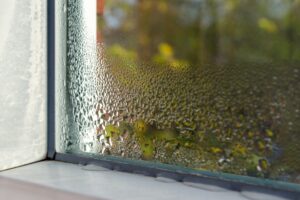 We all know how temperatures work. A home can be warm while the outside is cold. That’s just basic math. As long as you’ve got a functioning heater, this shouldn’t really be a problem. And if you don’t, we can help you fix that problem for good.
We all know how temperatures work. A home can be warm while the outside is cold. That’s just basic math. As long as you’ve got a functioning heater, this shouldn’t really be a problem. And if you don’t, we can help you fix that problem for good.
However, when moisture is brought into the equation, things get complicated. HVAC in Doylestown, PA can seem like it’s all about hot and cold temperatures, but we also have to worry about humidity and moisture. In the summer and winter months, humidity can be a topic of conversation, but we also need to talk about condensation and how to avoid major problems that come with those pesky water droplets.
Today, we’ll talk a bit about what condensation is, why it’s the subject of today’s blog, and what you can do to avoid problems with condensation this winter.
What Is Condensation?
When temperatures are higher indoors than they are outdoors (usually that’s the case during the wintertime in Pennsylvania), moisture will remain in your air as water droplets called water vapor. That water vapor is important for your home and family’s health, and we often call this kind of water humidity. Humidity levels will differ between your home’s air and the outdoor air, because colder, winter air is dryer and has less humidity. So then how does condensate form on your windows and cause trouble?
Well, as soon as the humid air of your home reaches the vicinity of your ice-cold windows, the water will begin to condense and form droplets on the window. Without proper insulation, double-paned windows, or proper humidity control, this condensation will keep forming. Soon it will be hard to see out of your windows or doors because the entire thing is covered in a thin layer of condensation.
Why Is This a Problem?
It’s just water, right? How could small droplets of water be a problem? Well, water is always a problem when it’s allowed to sit stagnant for long periods of time in a dark, cool environment. Excessive water on your windows, doors, and frames could lead to mold growth at an unprecedented rate. Also, it could start messing with your indoor humidity levels. Making certain rooms feel dry while the humidity that you’d rather breathe in is getting caught on the windows.
Solve the Problem
Sometimes the solution to this kind of problem is tricky. It requires an all-encompassing solution that comes from the whole HVAC system in your home.
For starters, getting window insulation and investing in double-paned windows can help tremendously. Also, making sure your home’s humidity levels (with the help of a humidifier or dehumidifier) are accurate can reduce the amount of water condensation you’ll end up dealing with. Also, make sure your heater is properly maintained, so it’s not expelling moisture into the air. Some high-efficiency furnaces and other heating systems create water as an exhaust, which could be a problem if there’s leakage into your home. These kinds of problems can be detected and quickly removed through comprehensive maintenance.
Call Carney Plumbing Heating & Cooling for comprehensive heater and humidity control.

